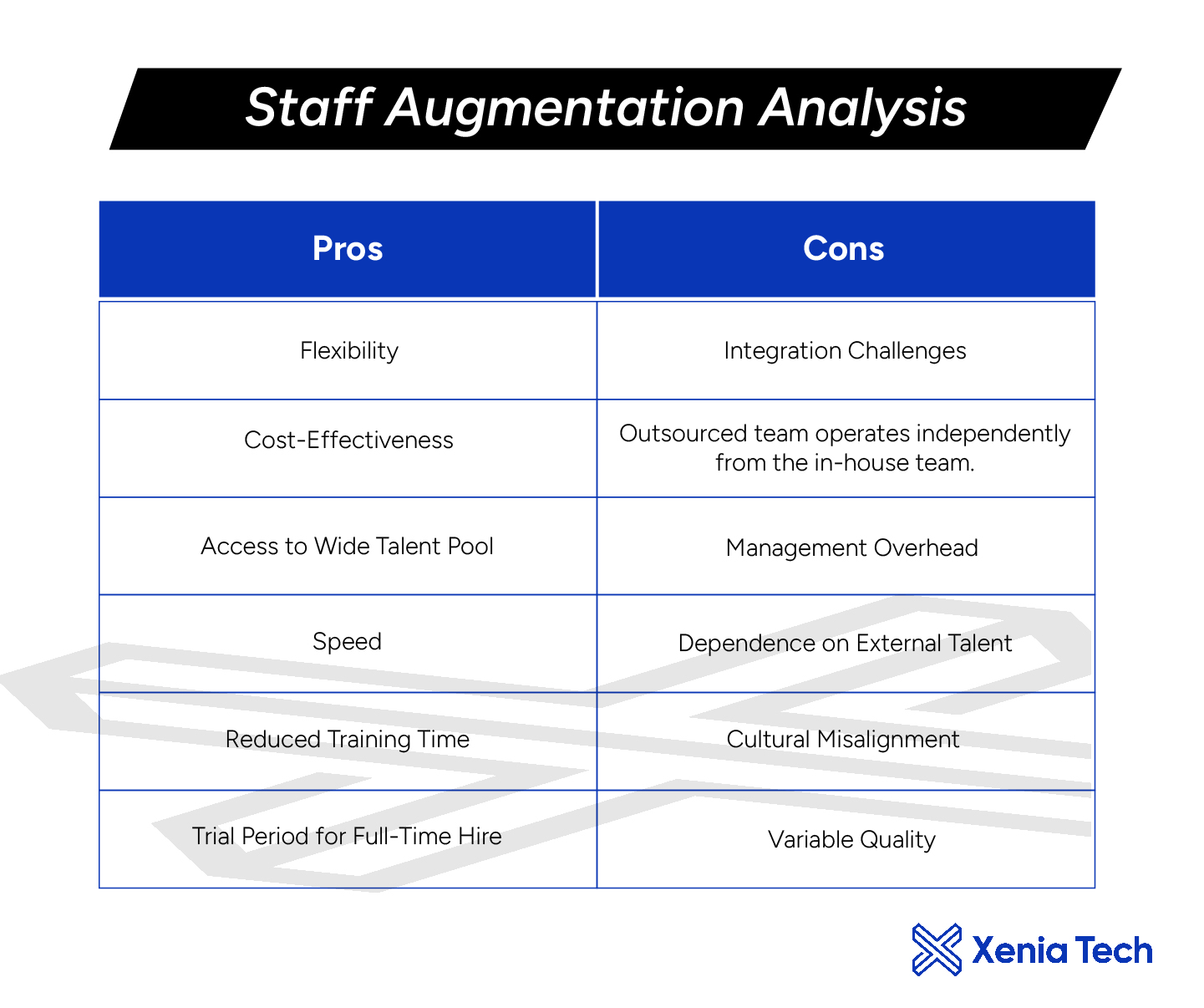As businesses face increasing pressure to deliver projects on time and within budget, the need for a flexible and responsive workforce becomes more critical.
Customer expectations also change rapidly along with the dynamic market, so staff augmentation has become a popular strategy to address these challenges. This approach offers extreme flexibility to scale up your workforce or cut down based on the project demand. Staff augmentation has proven its success since it appeared in the late 20th century. However, there are also some potential downsides that you have to consider.
In this article, we will go through the Pros And Cons Of Staff Augmentation, we hope that it can help you with your business.
The Pros of Staff Augmentation
Flexibility
One major and obvious advantage of staff augmentation is flexibility. Companies can quickly scale their workforce up or down based on current project demand.
This flexibility helps maintain optimal staffing levels without the burden of permanent hires. Staff augmentation offers an easy process to add new employees to an in-house team, or replace any staff that underperforming or does not fit with the requirements of the position.
Cost Savings
Compared to traditional hiring, staff augmentation can reduce the huge amount of the cost you spend. Permanent staff involve additional costs such as benefits, training, and long-term salaries. On the other hand, temporary staff are hired for a short period, or on project duration, reducing overhead expenses. This allows businesses to allocate resources more efficiently without a long-term financial commitment.
Access to a Wide Talent Pool
Another significant benefit of staff augmentation is access to the right talent in a bigger talent pool to fulfill the current skill set that your business lacks. For projects requiring niche skills or expertise not available in-house, staff augmentation is an ideal solution. Companies can hire an on-demand professional with specific competencies, ensuring their projects are handled by experts. It is especially beneficial when you do not require these skills on a long-term basis.
Speed Project Execution
In the competitive world of business, you have to be quick to take the chance. Traditional hiring processes can be lengthy and cumbersome, potentially delaying project timelines. As a result, you may lose a client if you can not fulfill their requirements on time.
Staff augmentation allows companies to bring in skilled professionals rapidly, ensuring projects stay on track and deadlines are met. This speed is essential in dynamic industries where time-to-market is critical.
Reduced Training Time
Augmented staff are typically experienced professionals who require minimal training. They can quickly adapt to project requirements and start contributing immediately. This reduced training time allows businesses to focus on project execution rather than investing time and resources in onboarding new employees.
Trial Period for Full-Time Hire
Staff augmentation sometimes also serves as a trial period for potential full-time hires. Companies can evaluate the performance and fit of temporary staff before making a long-term commitment. This trial period helps ensure that only the best candidates are selected for permanent positions, reducing the risk of bad hires.
The Cons of Staff Augmentation
Despite its benefits, staff augmentation presents certain challenges.
Integration Challenges
One main issue is the integration of temporary staff with the existing team. Augmented staff may face difficulties blending with the company culture, languages, and environment, affecting collaboration and productivity.
Security Risks
Bringing in external personnel can pose security risks, especially with sensitive company data. Companies need to implement robust security measures to protect their intellectual property.
Careful vetting of temporary staff and ensuring they adhere to security policies is essential to mitigate these risks.
Dependence on External Talent
Over-reliance on augmented staff can lead to a lack of internal skill development. Companies may become dependent on external resources for critical tasks, which can be a strategic disadvantage in the long run. It is important to balance the use of temporary staff with initiatives to develop in-house talent.
Cultural Misalignment
Temporary staff may not fully align with the company’s culture, values, or work ethic. This misalignment can cause friction within the team and impact overall morale. Organizations need to foster an inclusive environment where temporary professionals feel welcomed and valued.
Variable Quality
The quality of augmented staff can vary significantly. There is always a risk of hiring individuals who do not meet the expected performance standards. To mitigate this risk, companies should work with reputable staffing agencies and conduct thorough evaluations during the hiring process.
Is It Right For Your Business?
To answer this question, you probably have to define your company objectives, or the project goals and requirements, then list down the Pros And Cons Of Staff Augmentation that may affect your company.
Staff augmentation fits well with short-term, projects work, you can also use different strategies such as project outsourcing, and a dedicated team for each project of your business. Carefully analyzing the possible risks that each model may have will help you to make the best decisions.





